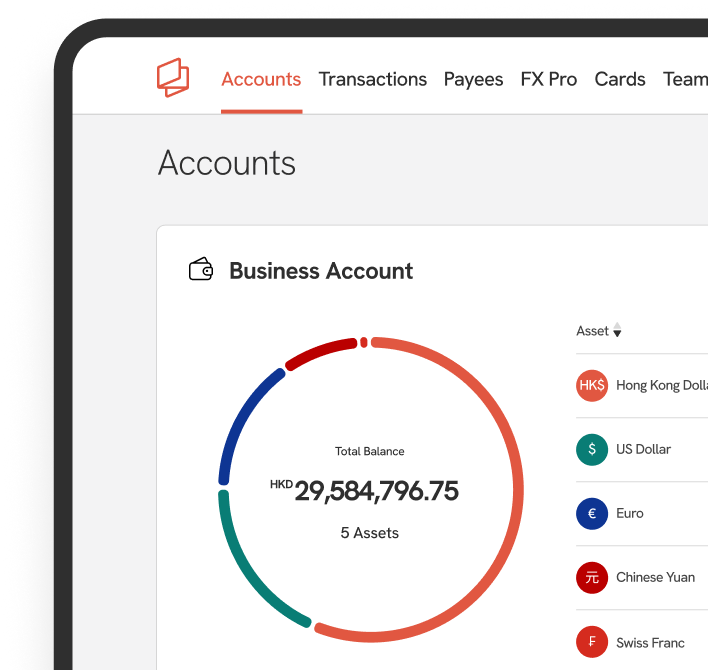Key Takeaways
The four new digital banks are GXS Bank, MariBank, ANEXT Bank, and Green Link Digital Bank
The digital banks mainly offer better interest rates and lower fees compared to traditional banks
The digital banks also boast high security and online banking features that make life easier for users.
Singapore is a major financial hub with more than 200,000 people working in its financial sector. The city-state’s economy is mainly driven by services and trade. It also has significant manufacturing industries, including electronics, pharmaceuticals, chemicals, and textiles.
As such, there is a large demand for digital-first platforms, and the most recent evolution of this demand is the awarding of digital banking licenses.
We'll review the four new digital players in the banking scene in Singapore.
Reviewing the New Digital Banking License
The Monetary Authority of Singapore (MAS) announced that it awarded four new digital bank licenses at the end of 2020. Two of which are Digital Full Bank licenses, and the other two are Digital Wholesale Bank Licenses
Here's a breakdown of what makes the two digital banking licenses different:
Digital Full Bank (DFB)
- Serves retail customers with a deposit cap of $75,000 for each individual
- Starts as a Restricted Digital Full Bank in Singapore and offers simple credit and investment products
Digital Wholesale Bank (DWB)
- Serves small and medium-sized enterprises (SMEs) and other non-retail segments
- Opens and maintains deposit accounts for businesses
These new digital banks include:
Digital Full Bank Licensed
Digital Wholesale Licensed
GXS Bank (Singtel and Grab)
GXS Bank (Singtel and Grab) is the first full-service digital bank licensed in Singapore. It will offer retail and corporate banking products while focusing on mobile payments and lending.
GXS Bank merged Singtel's existing consumer business with Grab, an online food delivery platform.
GXS Savings Account
GXS Savings Account, offered by the digital-only bank GXS, brings a refreshing simplicity to banking. With a focus on hassle-free financial management, this account provides up to 2.68% per annum on cash savings, similar to traditional bank savings accounts, while maintaining a straightforward approach with no fees and convoluted requirements.
Again, similar to traditional savings accounts, GXS allows users to deposit their cash and earn daily interest, eliminating the need for monthly conditions or intricate hoops to jump through. The account is divided into two categories – the Main Account, earning 2.38% per annum, and the Savings Pockets, offering a higher interest rate of 2.68% annually. This structure encourages users to achieve their savings goals more efficiently.
One standout feature is the introduction of Savings Pockets, akin to digital "money jars," enabling users to allocate funds to specific goals effortlessly. This innovative approach enhances clarity in saving and budgeting, promoting better financial habits.
Benefits of GXS
Notably, the GXS Savings Account is protected by the Singapore Deposit Insurance Corporation (SDIC) up to S$75,000, ensuring a level of safety comparable to traditional banks. Moreover, GXS does not impose any fees, including account fees, fall-below fees, deposit fees, or withdrawal fees, providing users with a fee-free banking experience. Overall, the GXS Savings Account emerges as a user-friendly and transparent option for those seeking higher interest rates without the complexity.
Maribank (Sea Limited)
Sea Limited is a wholly-owned subsidiary of Temasek Holdings. It is the second fully digital bank-licensed company in Singapore. Its main focus is to provide financing solutions for SMEs.
MariBank is a fully digital bank revolutionizing the banking landscape with its online-only presence, providing convenient and accessible services exclusively through the MariBank mobile app. As a licensed and regulated entity by the Monetary Authority of Singapore, MariBank operates under a Digital Full Bank License, ensuring compliance and accountability in its financial services.
Catering to both retail and business users, MariBank offers two key services:
Mari Savings Account
This no-frills savings account yields a promotional rate of 2.88% p.a. until March 31, 2024, with no minimum deposit or spending requirements. The account supports Shopee transactions, PayNow QR codes, and fund transfers. MariBank distinguishes itself by not charging any fees for opening or using a Mari Savings Account.
Mari Invest
Designed for low-risk investments, Mari Invest allows users to grow their money with a return rate of up to 3.87% p.a. (as of Nov 7, 2023). This investment account, managed by Lion Global Investors, imposes no fees, offers flexibility with a minimum investment of S$1, and participates in the Lion-MariBank SavePlus fund. While not insured, funds in Mari Invest are held separately in a custodian account, providing safeguards in case of MariBank liquidation.
Benefits of MariBank:
MariBank emphasises simplicity and higher interest rates without the complexities of traditional banking. The Mari Savings Account and Mari Invest enable users to earn competitive interest without needing salary crediting, minimum deposits, or spending commitments, offering a user-friendly and financially rewarding experience.
ANEXT Bank (Ant Financial)
ANEXT Bank introduces a distinctive offering designed exclusively for Small and Medium Enterprises (SMEs), addressing their specific financial needs with precision and efficiency. The ANEXT Business Account stands out as a versatile tool for businesses, providing a range of benefits to navigate the challenges of today's market.
Competitive Interest Rates
The ANEXT Business Account offers a daily interest rate of up to 0.68% p.a*, presenting a lucrative promotional rate that enhances the value of idle cash.
Dual-Currency Capability
Supporting both SGD and USD, the account boasts Foreign Exchange (FX) capabilities in major trading currencies like EUR, GBP, HKD, JPY, KRW, MYR, and THB. This feature streamlines cross-border transactions, providing enhanced convenience for businesses engaged in international trade.
Cost-Effective Operations
ANEXT acknowledges the financial challenges fledgling businesses face and addresses this by waiving upfront fees. The account is free to apply for, with no annual or fall-below fees, and requires no initial deposit.
Robust Security Measures
Recognising the rising threat of phishing scams, the ANEXT Business Account prioritises security. Leveraging robust technology, including three-factor authentication (3FA), every transaction is fortified with a login password, a one-time password (OTP), and facial verification, ensuring a secure banking experience for account holders.
Mobile Banking Convenience
ANEXT Bank complements the business account with a free mobile banking app, empowering SMEs to manage funds on the go.
The ANEXT Business Account emerges as a comprehensive solution that aligns with SMEs' primary concerns—convenience, security, and the ability to optimise every dollar while minimising costs. ANEXT Bank showcases a keen understanding of the intricate financial needs of SMEs, delivering a tailored banking experience that fosters growth and efficiency.
Green Link Digital Bank (Greenland Financial Holdings Ltd)
Greenland Financial Holdings is a fully owned subsidiary of Greenland Holdings Pte Ltd. It is the second Digital Wholesale Bank licensed company in Singapore.
In the realm of digital banking, Greenlink Digital Bank (GLDB) stands out with a distinctive approach to serving Micro, Small, and Medium-sized Enterprises (MSMEs) and non-retail clients. Unlike traditional banks and their digital counterparts, GLDB adopts a unique strategy that avoids limiting its clientele based on revenue size.
Client Classification Without Revenue Constraints
GLDB breaks away from the conventional segmentation employed by traditional banks, which assess clients primarily based on revenue size. Instead, GLDB focuses on addressing diverse business needs without rigid revenue-based classifications.
Loan Flexibility Beyond Revenue Size
Unlike traditional banks that adhere to strict revenue thresholds for loan eligibility, GLDB allows businesses to access loans based on their specific needs rather than revenue size.
Supply Chain Financing for Smaller Clients
GLDB introduces a supply chain financing program that extends financial support to suppliers of smaller-sized clients, catering to businesses within the S$50 – S$100 million turnover range.
Trade Finance Facilities
GLDB enhances its loan product structure with trade facilities, offering payable and receivable financing options. These facilities provide businesses with structured financing solutions for purchase and sales invoices on an open-account basis, contributing to better cash flow management.
Documentary Requirements and Speed
While GLDB introduces innovative approaches, certain aspects retain traditional elements. Documentary requirements, including a six-month bank statement, financial statements, and GST returns, align more with traditional banks than fully digital entities like ANEXT. However, GLDB compensates with flexibility in approvals, allowing for a more nuanced assessment, which may contribute to tailored solutions.
In summary, GLDB emerges as a dynamic player in the digital banking landscape, challenging conventions by prioritising diverse business needs over revenue-centric classifications.
How Are the Digital Bank License Winners Chosen?
The selection process of winning applicants began in May 2019 when the MAS published the Request For Proposals (RFP). Applicants were asked to submit their proposals by September 30th, 2019.
After receiving the proposals, the MAS conducted due diligence before issuing the RFPs for further evaluation.
The final selection was made based on the following criteria:
- The applicant must have a minimum net worth of $100M USD or SGD$200M SGD;
- The applicant’s core business must not overlap with any other entity already approved for a similar license;
- The applicant must demonstrate a strong commitment to customer service and compliance;
- The applicant should show evidence of having sufficient capital to support operations during the initial phase of operation;
- The applicant should have a proven track record of success in the relevant industry;
- The applicant's proposed business model should align with the objectives of the licensing framework;
- The applicant shall comply with all applicable laws and regulations, including those related to money laundering and terrorist financing;
- The applicant may only hold licenses that do not involve activities prohibited under the Money Laundering Act, the Proceeds of Crime Act, and the Terrorism Financing Act;
- The applicant is subject to approval by the Monetary Authority of Singapore.
What Does This Mean for Consumers?
Singaporeans can expect to see many changes in how they access banking services as these new banks enter the market.
Some of the major changes include:
- Accessing accounts at multiple banks via mobile applications instead of visiting physical branches;
- A greater number of products available from each bank;
- The banks offer more competitive interest rates;
- Better customer service and more personalised experience;
- Lower fees charged by the banks;
- Faster transactions.
SMEs Also Stand to Benefit
Small and Medium Enterprises will be able to take advantage of lower costs incurred by using online channels such as mobile apps and internet banking.
They will also get better access to finance through innovative solutions catering to their needs.
For example, they can use digital platforms to manage cash flow and borrow funds competitively. They can also get advice on managing their finances and improving their businesses.
💡 Read more: Here are the five best business bank accounts in Singapore.
Are There Any Downsides?
There are some concerns about whether the new entrants will be able to compete effectively against the existing players in the market.
However, the MAS has taken steps to ensure that competition remains fair.
For instance, the MAS has set up an independent review panel to monitor the performance of the new entrants over time. This ensures that the new entrants are held accountable if they fail to perform well.
In addition, the MAS has been very transparent about its decision-making processes so that the public can understand why certain applicants were selected and others weren't.
It has also provided a detailed explanation of the rationale behind its decisions.
This helps to build trust among consumers and stakeholders alike.
What Are Some of the Most Successful Digital Banks Globally?
The following are examples of digital banks which have successfully established themselves in different markets around the world:
- First Global Bank (FGB): Founded in Hong Kong in 1994, FGB is one of the largest international banks in Asia. It offers a range of financial products and services to individuals, small and medium enterprises, and corporations.
- Monzo: Launched in 2012, Monzo is a UK-based digital bank offering customers a simple way to save, spend and borrow money. Customers can choose between a basic account or a premium account.
- N26: Founded in Germany in 2013, N26 provides individuals and SMEs with a full suite of personal banking services. Its core product is a mobile app that allows users to view their balances, make payments, and transfer money.
- Simple: Founded in 2007, Simple is a US-based digital bank with a focus on simplicity and transparency. It offers three types of accounts - Basic, Premium, and Business.
- Starling Bank: A subsidiary of BBVA, Starling was founded in 2016 and is based in London. Starling's mission is to provide a simple and accessible banking solution.
FAQs
What are digital banks, and how do they differ from traditional banks?
Digital banks operate exclusively online without physical branches, offering banking services through mobile apps and web platforms. They often provide more competitive rates, user-friendly interfaces, and innovative features compared to traditional banks.
Who are the new digital bank players in Singapore?
What unique features do these digital banks offer?
Are digital bank accounts safe and insured in Singapore?




